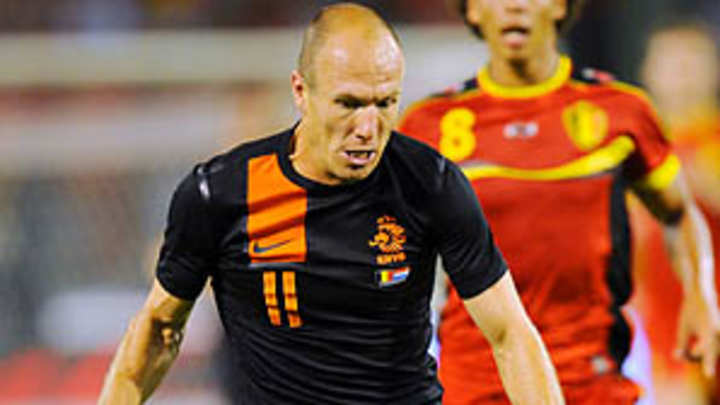Plenty to learn from this chapter of friendlier Holland-Germany rivalry

One of post-war Europe's fiercest rivalries has lost a lot of its poisonous edge in the wake of mass Dutch immigration to the Bundesliga in the last few years. It's quite tough to hate players you share a club changing room with on a daily basis.
"The atmosphere between the two countries (Germany and the Netherlands) is less tense (than in years gone by)," said Arjen Robben, the Dutch footballer who plays for Bayern Munich.
The political overtones of this derby have all but disappeared, and contrasting fortunes on the pitch since Euro 2008 have also weakened the contest's emotional pull. For the first time in living memory, an "Elftal" in the middle of a rebuilding process doesn't quite consider itself Germany's equal.
"They are one or two steps ahead of us in terms of quality," admitted Robben. An emphatic German 3-0 win in a Hamburg friendly 12 months ago and at Euro 2012, when Germany beat Oranje 2-1 and Bert van Marwijk's side went home without a point after the group stage, showed the difference in class. Wednesday night will give some indication if the gap has narrowed, but even that prospect is less enticing since the Dutch can, at best, beat a Germany B team.
Nine players, among them key midfielders Bastian Schweinsteiger, Toni Kroos (both Bayern), Sami Khedira and Mesut Özil (both Real Madrid) are missing for German coach Joachim Löw. "It's always a matter of prestige against Germany," said Werder Bremen-based midfielder Eljero Elia. But in collective terms, either side has little to gain. Holland can't hope to avenge the Euro defeat -- "revenge can only be had at the World Cup," said Robben -- nor can the Germans really make up for the embarrassing 4-4 draw in the qualification match against Sweden after a 4-0 lead a month ago.
A bet between Hamburg teammates René Adler and Rafael van der Vaart over who'll be forced to wear a Germany shirt for the next club training session if his side gets beaten by the visitors at the Amsterdam Arena sums up the light-hearted nature of the match. Shudder the thought: Wednesday night's meeting might well be the friendliest Netherlands-Germany friendly ever.
To be fair, Dutch manager Louis van Gaal did try to provoke his opponent on the touchline a little bit last week. "Löw hasn't won much yet," said the 61-year old van Gaal.
Löw does not possess the resume of Van Gaal. The German coach has merely captured the DFB Cup and Austrian championship compared to van Gaal's success at Ajax, Barcelona and Bayern. But Löw took the bait and shot back on Tuesday. "It's also important for a manager to qualify for tournaments," he said, in reference to Van Gaal missing out on the 2002 World Cup during his first spell in charge as "Bondscoach."
There was no real venom in the exchange, however, as Van Gaal followed up his snide remark with some genuine praise. "Germany play fantastic football, that's the merit of Löw," he said.
Despite the lack of sporting relevance of a match that's uncomfortably sandwiched between two Champions League weeks, Robben insisted that they will learn from it. "It's probably more important than a qualification game," the 28-year-old said, "Germany are a world-class team, whereas (our qualifier opponents) Estonia and Hungary aren't."
Four wins in four competitive games since Van Gaal took over the national team suggests that the re-jigged setup is working, but Robben is perhaps right to distrust these early signs. The Netherlands, like Germany, won every qualification game en route to the Euro finals but looked disjointed, weak in defense and riven with internal problems in the Ukraine.
Robin van Persie's absence due to a muscle strain ensures that the biggest cause of unrest, the rivalry with Schalke striker Klaas-Jan Huntelaar, will not be on the agenda this week. The continued injury problems of Wesley Sneijder make it also easy for Van Gaal to hand the coveted central playmaker role to Van der Vaart. It's a similar story when it comes to the PSV Eindhoven trio Kevin Strootman, Jeremain Lens and Luciano Narsingh. They were key figures in Van Gaal's rejuvenated post-Euro teams over the last few months but all miss out with minor problems. Thus, veterans Dirk Kuyt and Nigel de Jong will be back to give the Dutch midfield and attack a fairly familiar look.
Further back, however, Van Gaal can continue to rely on newer faces. Tim Krul (Newcastle) will replace unfit goalie Martin Stekelenburg, and John Heitinga (Everton) will provide a bit of experience to a back four of fringe players Ron Vlaar (Aston Villa) and youngsters Bruno Martins Indi (Feyenoord) and Ricardo van Rhijn (Amsterdam), who are both still relatively untried at this level. It'll be instructive to see how they can cope against a Germany attack that's likely to be spearheaded by Marco Reus of Borussia Dortmund. Furthermore, Van Gaal will like to see plenty of attacking support from his fullbacks to provide a dynamism that was lacking in Van Marwijk's pretty pedestrian lineup this June.
The most intriguing choice could concern the second central midfield position, however. Van Gaal has hinted at handing Marco van Ginkel his debut in the national team. The 19-year-old Vitesse Arnheim player is a tall, complete midfielder in the mold of the Bender brothers and has been described as "the gem of Dutch football" by former international Theo Janssen. Van Ginkel's performance on Wednesday night could well determine how far Van Gaal will push his agenda of youth in coming months. So even if the quality and rivalry might be somewhat diminished on both sides, there'll be plenty of insight in terms of individual progress and the strength of back-up options to be had. And who knows -- a mistimed tackle or two from De Jong could even make it a feisty affair after all.
